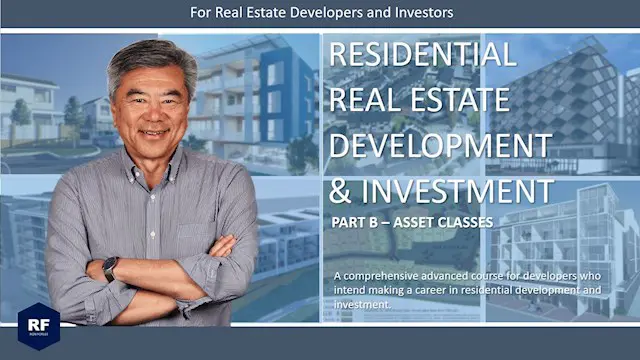
Residential Real Estate Development and Investment – Part B
Residential Asset Classes -Developing and investing in various types of residential projects
AYR International
Summary
- Reed courses certificate of completion - Free
Add to basket or enquire
Overview
If you intend making a career in Residential real estate development, then this in-depth course is a must. While the course “An Intelligent Guide on Real Estate Development” provides an overview of real estate development, this comprehensive course covers the comprehensive all aspects of Residential real estate development and investment. The content is extensive that it had to be split into two sections namely, (a) Principles and Process and (b) Asset Classes or types of residential projects. Part A “Principles and Process” covers areas of the residential development process in detail and tips on each aspect. While this course is based within the Australian context, the development principles apply to many other countries as well.
Curriculum
-
Preface 03:03
-
1. Introduction 08:16
-
2. Low-density residential developments 56:12
-
3. Medium-density residential developments 1:10:16
-
4. High-density residential developments 1:47:25
-
5. Senior’s residential developments 1:34:42
-
6. Student housing 1:03:43
-
7. Residential land development 1:24:40
-
8. Co-living residential developments 1:29:36
-
9. Conclusion 20:35
Course media
Description
Residential developments and investments come in many forms from small renovations to multi-storey apartment blocks. Each type has its own characteristics and should be approached differently to maximise their financial return. Under this course, the lectures study the various asset classes and arrives at development strategies extract maximum return on investment. In addition to general housing, the lectures also include senior’s accommodation such as retirement villages and aged care plus student housing and co-living developments.
What you will learn from this course?
- Learn about the particulars of the various residential developments and which one will suit your circumstances.
- Study the key success factors and development strategies of each asset class.
- How to undertake a feasibility study of each asset class
- How start with small residential renovation and advance to developing apartment blocks
- How to finance each asset type through syndication or joint venture
- Learn about the future trends in residential development and investment
CURRICULUM
- Introduction
- Low-density residential developments
- Medium-density residential developments
- High-density residential developments
- Senior’s residential developments
- Student housing
- Residential land development
- Co-living residential developments
- Conclusion
Who is this course for?
- Emerging Developers / Entrepreneurs
- Builders / General Contractors
- Professional Consultants (Architects, Engineers, Quantity Surveyors etc.)
- Real Estate Lawyers /Accountants
- Construction Project Managers
- Property Owners
- Landowners / Investors
- Real Estate Agents
- Finance Consultants
- Investment / Fund Managers
Requirements
Microsoft Excel
Microsoft Project Management
Completed Part A of this course
Career path
Residential development is an excellent way to start a career in becoming a developer. Many successful developers started off with small residential developments. Some remained focused in this sector while others have built stellar careers in lucrative commercial projects.
Questions and answers
Currently there are no Q&As for this course. Be the first to ask a question.
Certificates
Reed courses certificate of completion
Digital certificate - Included
Will be downloadable when all lectures have been completed
Reviews
Currently there are no reviews for this course. Be the first to leave a review.
Legal information
This course is advertised on reed.co.uk by the Course Provider, whose terms and conditions apply. Purchases are made directly from the Course Provider, and as such, content and materials are supplied by the Course Provider directly. Reed is acting as agent and not reseller in relation to this course. Reed's only responsibility is to facilitate your payment for the course. It is your responsibility to review and agree to the Course Provider's terms and conditions and satisfy yourself as to the suitability of the course you intend to purchase. Reed will not have any responsibility for the content of the course and/or associated materials.


